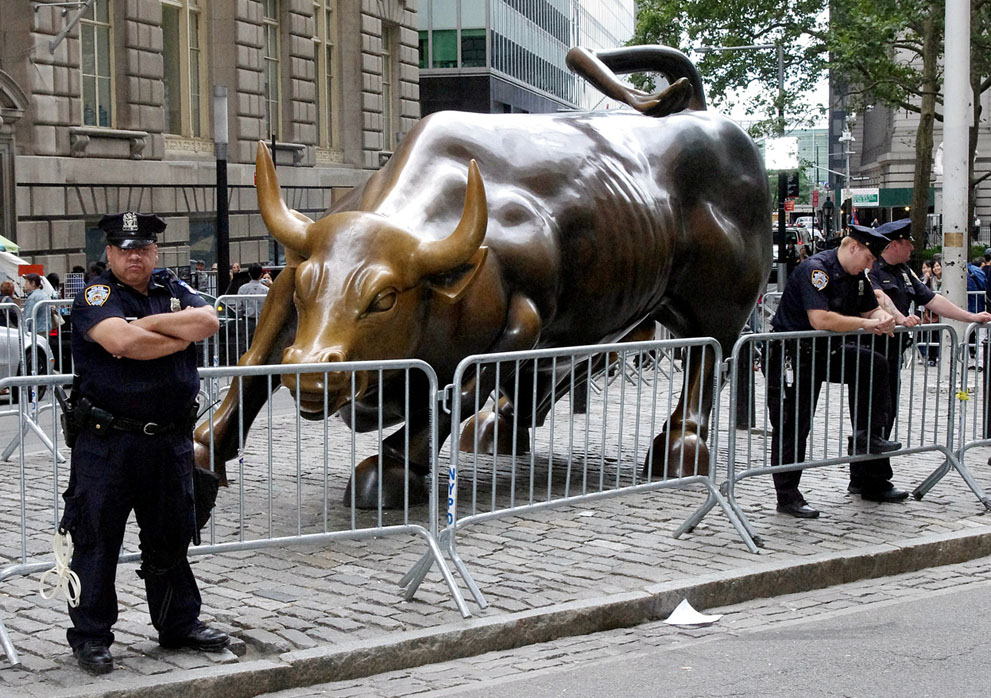A slide show at The Big Picture emphasizes that political demonstrations are breaking out all over the place. And so they are: Argentina, Bolivia, Egypt, Greece, Haiti, Indonesia, Russia, Spain, Syria, and many more countries are becoming defined by people taking to the streets to denounce ruling elites. And the familiar iconography of raised fists, massed demonstrators, colorful banners, painted faces, and police violence suggest that all the protests are much the same. As institutions fail and political leaders temporize, we can imagine a common revolutionary impulse surging through the streets around the globe. The winds of change are blowing, and can the revolution be far behind?
Well, yes, there can be a bit of a delay. Which is why I like this photo from Rio de Janeiro, Brazil. An organization named Rio de Peace planted hundreds of brooms “to symbolise the need to ‘sweep away’ corruption in the Brazilian National Congress.” If all you care about is eye candy, this is the photo of the month for you. If you want to make light of the recent demonstrations on Wall Street or anywhere else, this image could be your poster child. Although it’s a genuinely novel and almost enchanting remake of a very tired cliche, it also seems to hover somewhere between art for art’s sake and a Disney animated movie. More to the point, it could have been designed and funded by a corporate sponsor–“OK, people, we’ve got to do something creative about corruption. How about brooms at the beach?”
In short, if demonstrations are to be more than mere symbolism, they have to be about putting your body on the line, and so the brooms seem to capture exactly the wrong kind of attention. But that may be too harsh, even without knowing a thing about the situation in Brazil. The important thing to recognize about most of the protests occurring this year is that they are not going to change much, and that they are going to continue anyway, and should. Likewise, many of them will be misunderstood if they are seen as revolutionary actions, or even as steps toward a revolution. Taking politics to the streets may have that potential, but it also is a hallmark of political systems defined by endemic divisions between mass and elite, rich and poor, the people and a ruling oligarchy. Thus, the symbols of change can also be indications that things already have moved in exactly the wrong direction. Instead of a return to social democracy, they can be symptoms of how much democratic institutions have been captured by capital.
And so maybe symbolism isn’t so incidental after all. There is no better icon of capitalism than the Merrill Lynch bull on Wall Street. (And note that there is no corresponding bear, so fair and balanced is no part of the story.) These cops have to do without their doughnuts, but otherwise this isn’t exactly tough duty. That bored banality while manning the state’s barricade is priceless. The likelihood of revolution is slim to none, but even so police power will be spent on keeping the symbols intact.
The brooms can remind one that the global protests are not all alike: each will involve complex local conditions, constraints, and possibilities. The barricaded bull can remind one that the symbols do matter–not least to those with the most to lose. Both images suggest that “revolution” may be the wrong term for describing the need to change a system that has become highly adaptable at resisting systemic change, even as it becomes increasingly dysfunctional and unjust.
Photographs by Felipe Dana/Associated Press and David Shankbone/Flickr.


“Likewise, many of them will be misunderstood if they are seen as revolutionary actions, or even as steps toward a revolution.” Nicely put.
From the comments I’ve read there’s utter confusion on the part of the people in the street between a Petition, a Demand, a Protest, and a Revolution. While one can lead/connect/lead to another, they are quite separate.
A nice photo of the bulls guarding the bull.
Another place for a broom.
http://members.efn.org/~hkrieger/broom.jpg